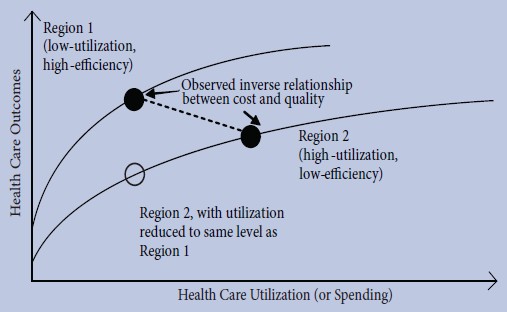Jim Hufford
First published 4/27/11 on Organon
 I’ve always been a little unsure about the policy ramifications of regional variations in medical care. The Dartmouth Atlas project’s findings—famously noted in Atul Gawande’s New Yorkerpiece comparing health outcomes and utilization in McAllen and El Paso, Texas—suggest an inverse relationship between the amount of care provided and the quality of health outcomes resulting from that care.
I’ve always been a little unsure about the policy ramifications of regional variations in medical care. The Dartmouth Atlas project’s findings—famously noted in Atul Gawande’s New Yorkerpiece comparing health outcomes and utilization in McAllen and El Paso, Texas—suggest an inverse relationship between the amount of care provided and the quality of health outcomes resulting from that care.
In other words, higher levels of care are associated with lower levels of health. That’s a pretty counterintuitive relationship, begging to be fleshed out with detail. Of course the key to the mystery is that some high-utilization areas are going way overboard on costly tests and procedures that are unnecessary and sometimes harmful.
And so you might think, “Aha! This is an overutilization problem. Doctors in these areas are ordering too many procedures, so we need to lower reimbursements to get them to cut back.” But doctors elsewhere with basically the same reimbursement rates, the same incentives, aren’t going similarly overboard. And we don’t expect that their outcomes would improve if they provided less care. And it’s not automatic that reducing the number of tests and procedures in McAllen would cut out only or mostly the harmful ones.
Anyway, via Austin Frakt, this graph from the Congressional Budget Office provides a helpful way to conceptualize the relationship between utilization and outcomes. It shows how an inverse relationship might appear in a comparison of two regions but not within a single region.

Austin explains:
Suppose we reduced reimbursements so that region 2 had the same utilization level as region 1. That would shift region 2 to the empty circle in the figure. However, at that point, region 2′s outcomes are even worse than they were to begin with. In other words, cutting reimbursements does reduce utilization, but it does so in a way that is harmful to outcomes.
The challenge is to reform policy to reduce spending while not harming outcomes (and, hopefully, improving them). A naive interpretation of geographic variations does not suggest the right reform. Simply spending less is not the right approach.
Jim Hufford is an attorney in San Francisco writing on health care matters from a legal perspective at Organon.